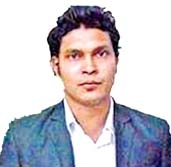
Shishir Reza :
Bangladesh is one of the mega biodiversity states in this present world and a wide variety of animal diversity is found in the wilderness areas of this country. Article 18A of the Constitution of Bangladesh deals with the protection and improvement of environment and biodiversity and provides, “The State shall endeavor to protect and improve the environment and to preserve and safeguard the natural resources, bio-diversity, wetlands, forests and wild life for the present and future citizens”.
The air we breathe is a product of photosynthesis by green plants; insects, worms, bacteria and other tiny organisms breaks down wastes and aid in the decomposition of dead plants and animals to enrich soils; more than 90% of the calories consumed by people in this world are produced from 80 plant species; almost 30% of medicines are developed from plants and animals. Some ecosystem services that benefit society are climate security, water purification, pollination and prevention of erosion. To feed such a large population, more land is being transformed from wilderness wildlife in agriculture, mining, lumbering and under areas for humans. Many people around the world depend on these species for their food, shelter and clothing. About 80% of our food supply comes from just 20 kinds of plants. Some of the health issues influenced by bio-diversity such as, dietary health and nutrition security, infectious disease, medical science and medical resources, social and physiological health and spiritual well being. A wide range of industrial materials are derived directly from biological resources. These include building materials, fibers, dyes, rubber and oil. It plays a part in regulating the chemistry of our atmosphere and water supply.
In general, for human progress and humane development, three conditions are important- 1. Ensure healthy longevity, 2. Enlightens human, and 3. Permanent increase in real income. Prof. Abul Barkat deeply analyses the health inequalities (health outcomes, health seeking behavior, economic burden of ill health). He mentions different dimensions of health – physical health, mental health, emotional health, intellectual health, social health, spiritual health and environmental health and their interconnection. The relationship between social and environmental health sometimes affect our physical (Cardiovascular, respiratory, reproductive and nervous system) and mental health (feelings, behavior, psychological challenge of life). Eminent economist Abul Barkat estimates the health care status in Bangladesh. Out of 170 million people, 80 million people are deprived to access primary health care; every year 50% child die out of 9 lacs people; 70 million people are deprived to drink pure potable water; 50% people suffer from hypertension; 10% people are diabetes patient in Bangladesh; 14% affected from chronic kidney diseases; 18-20 lacs people suffer from hearing diseases; thyroid problem suffers 1.5 crors people; 1.7 million people suffer from cancer; 23 lac women are affected from brest cancer; 2.5 t0 3 crore people suffers ostrio arthritis and 1.5 crore people affected by COPD Asthma.
Public health must be seen as real public goods, and accordingly, shall be addressed by the State. This is an issue of compliance with Constitutional rights. The government must invest in people’s health as not just a social sector investment but an investment towards accelerated economic development and poverty eradication. This is an issue of respecting people’s life and dignity. The people – especially the poor marginalized people – must know about health rights and must be adequately empowered to exercise and assert those rights.
Sustainable conservation of forest requires an entirely inclusive approach, combining modern skill and art, government policies and the attachment of local communities, whose lives depends on biodiversity. Sustainable development goals include good health and wellbeing for all by 2030. We need proper strategies, financial support and public participation to achieve this goal. To ensure health facilities for all, Barkat suggests forming a ‘Health Protection Department’ and to allocate as much as Tk 40,000 crore for it.
(Shishir Reza is an Environmental Analyst & Associate Member, Bangladesh
Economic Association).

